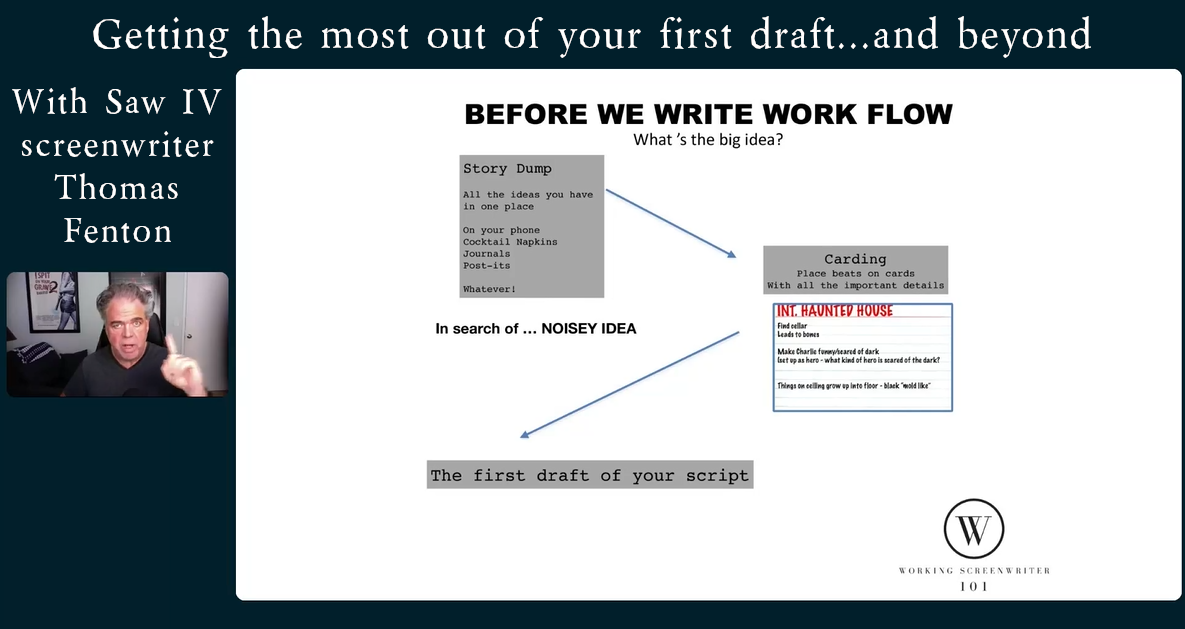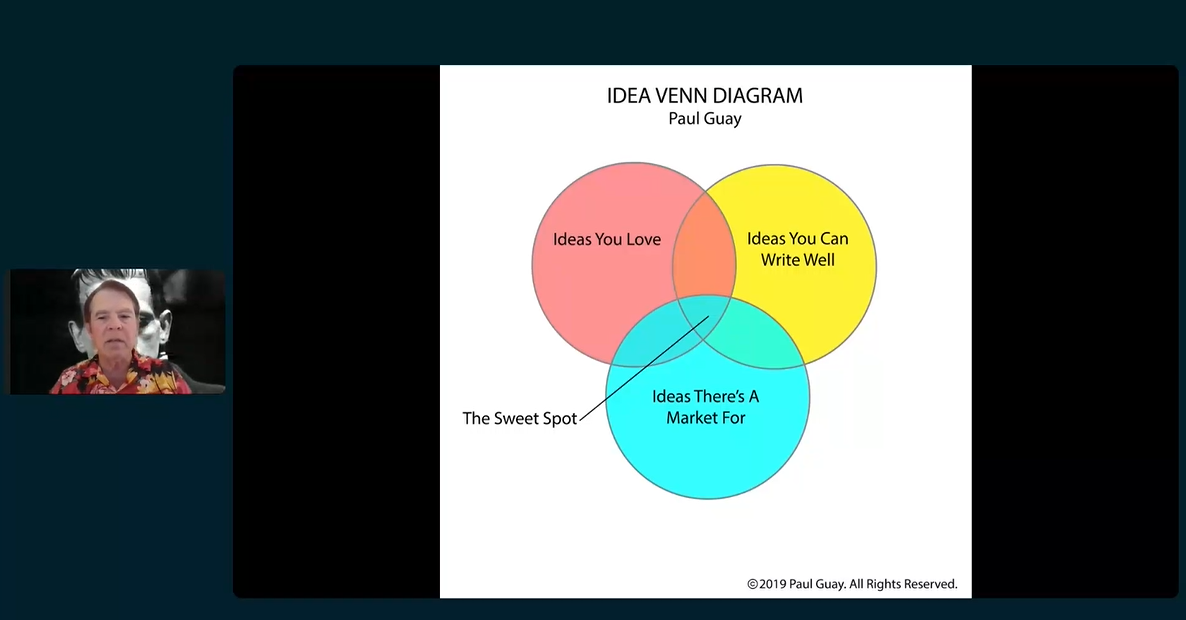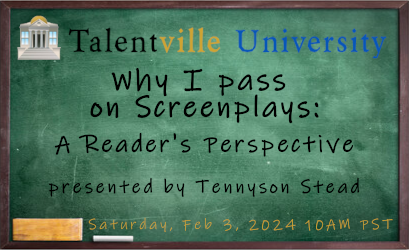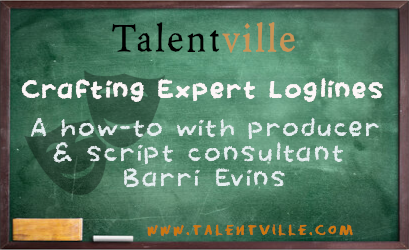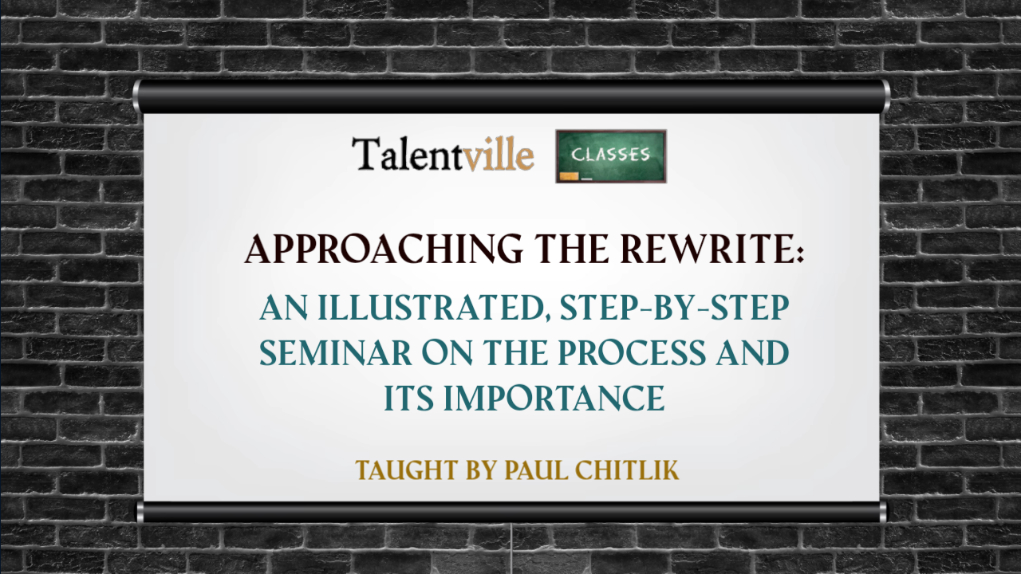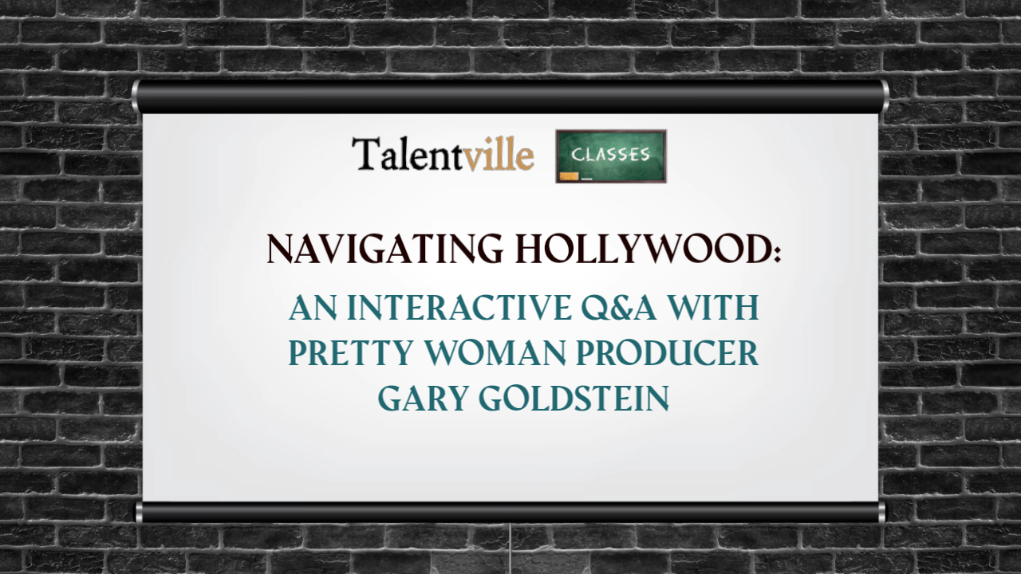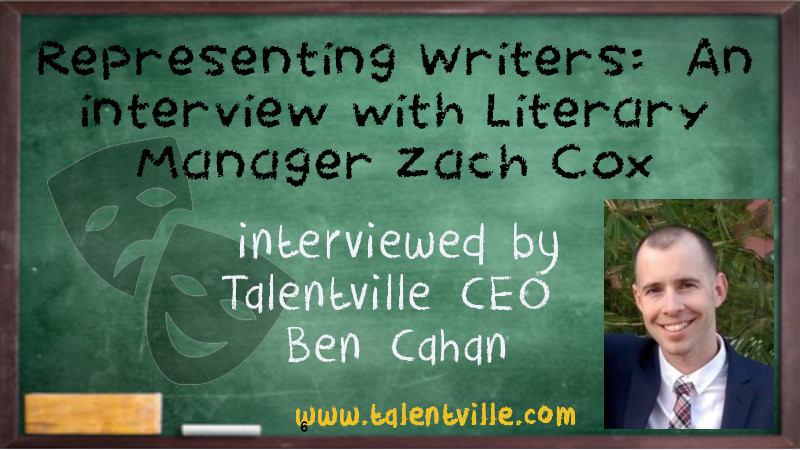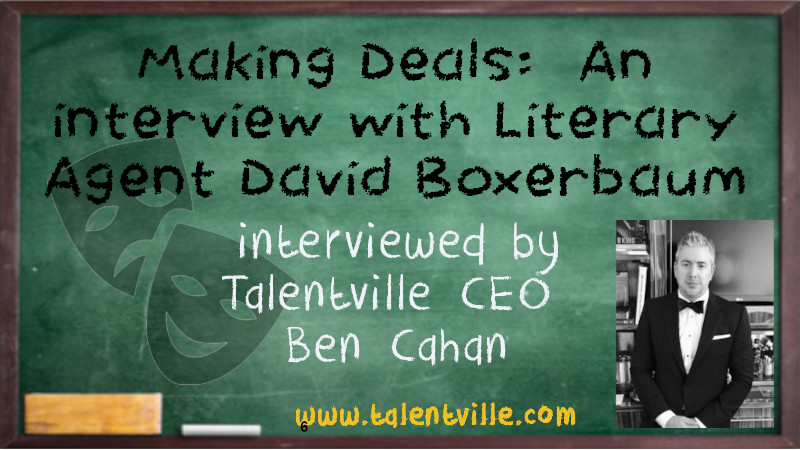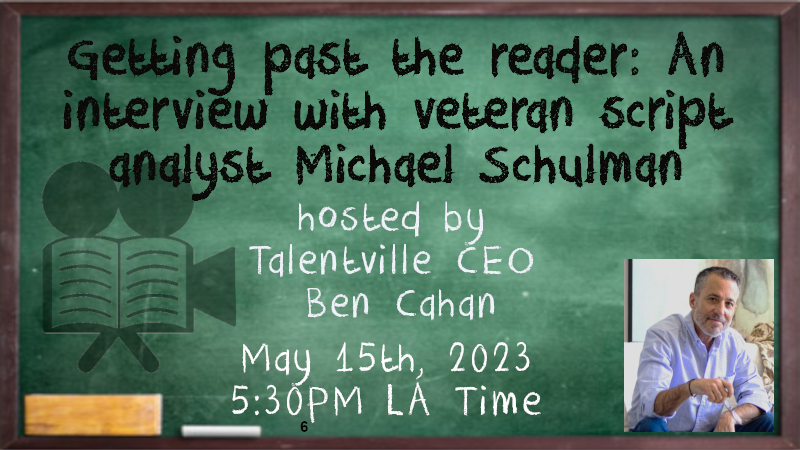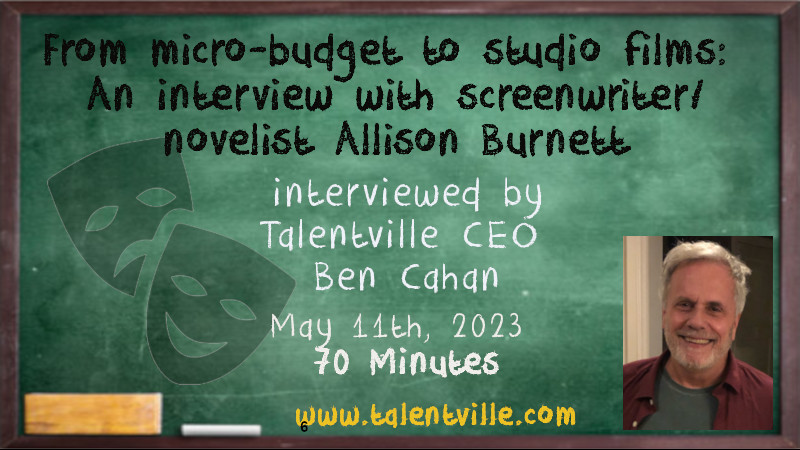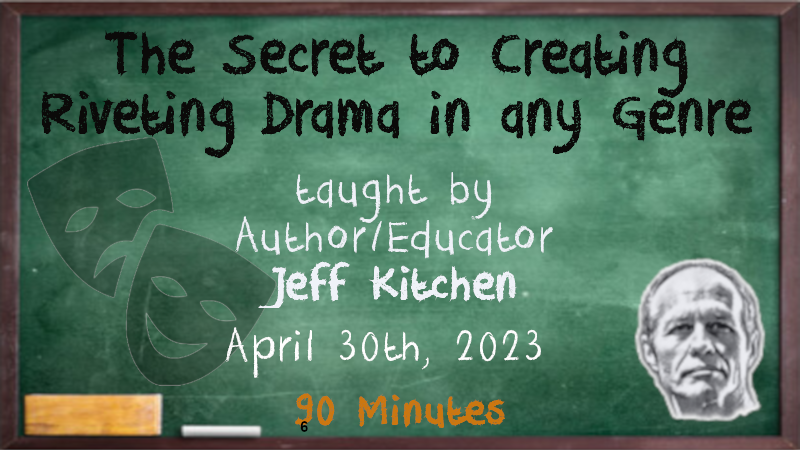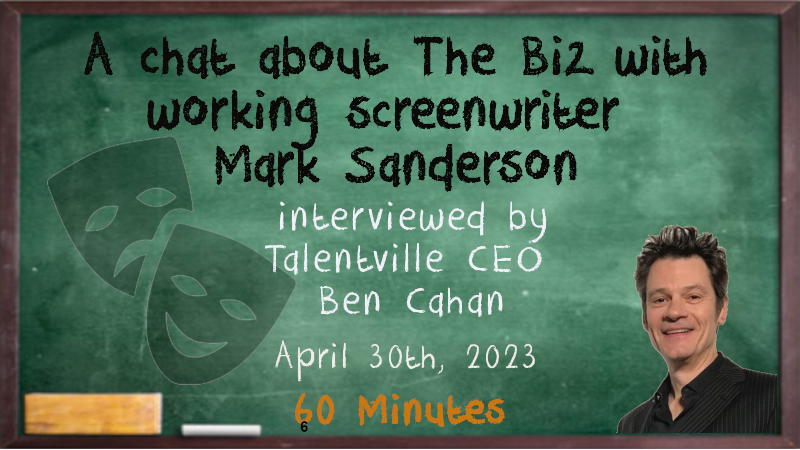Past Classes & Webinars
TAKING THE PLUNGE: How to dive in to your first draft
Presented by
This short seminar with kick your writing into overdrive.
What you will learn in 90 minutes:
1. How to prepare yourself to begin.
2. What the definition of story is.
3. The three ways to get into your story.
4. What your story is really about (premise).
5. How to understand your characters.
6. The basic structure of Hollywood screenplays.
7. The basic structure of a scene.
8. What to do next.
What you will create:
1. The basic premise (theme) of your movie.
2. The beginnings of character sketches of your main characters.
3. The basic outline of your movie.
4. The confidence to start any project.
SCRIPT ESSENTIALS: Scene Structure, Dialogue & Style
Presented by
A Masterclass on Scene Construction, Dialogue, and Supreme Style.
What You’ll Learn
- Why most scripts lose the reader before Act Two
- Why dialogue and description follow the same rules
- How to build purpose, pressure, and progress
- How to hold tension, even in the quiet moments
- The overlooked art of advanced formatting, whitespace, and visual pacing
- Why poor AI use leads to instant rejection and lasting damage
And yes, we’ll talk about AI.
Because if your work even vaguely smells artificial, it won’t just be your script that gets rejected. It’ll be you.
STORY ESSENTIALS: Mastering Premise, POV & Protagonist
Presented by
A Masterclass on Premise, POV & Protagonist - Three essentials to an engaging story
- A weak premise.
- A muddy point of view.
- A passive protagonist.
What You’ll Learn
- How they know you have a week Act 2 before you do
- Who should be the main character in your story
- Why your story happens in the first place
- The flip side of the passive protagonist
- What nobody ever tells you about loglines
- How to pressure-test your story idea early
- The best of Egri, Mamet, and Aristotle.
This class will make it easy to fix your concept and hard for producers to say no.
UNDERSTANDING VOICE: Developing and amplifying your creative DNA
Presented by
What You’ll Learn:
- Why voice matters from concept to pitch
- How AI can both assist—and assassinate—your authorship
- How to identify and amplify your creative DNA
- Why some rules must be broken to stand out
- How pro readers detect artificiality—and how you can, too
Write Like An Actor: Creating Characters from the Inside Out
Presented by
What You’ll Learn:
- How actors develop characters—and how to apply their methods to your writing.
- How to move beyond surface traits to psychology, motivation, and emotional depth.
- How to craft subtext and nuance that bring characters to life.
- Why actors break down scripts—and how you can use that process to strengthen your storytelling.
- How backstory shapes every choice a character makes.
Why It Matters:
🎬 Characters aren’t just words on a page—they need to feel alive.
📖 A well-developed character makes your screenplay more authentic and compelling.
🎭 The stronger your characters, the more actors will want to play them.
By the end of this webinar, you’ll know how to craft characters who think, feel, and make choices like real people—characters that actors will be dying to bring to life.
Don’t just write characters—become them.
How to avoid overwriting in your screenplays
Presented by
A few of the things Hank will cover in this webinar:
- Writing lean does not mean simply using fewer words.
- A screenplay is more like a piece of music than a piece of writing. Why? How?
- What to say and what not to say.
- It's all a conversation.
- Questions are better than answers.
- Forget what you learned in school.
- Get to the point, already!
- So what?
- Tips from a former reader.
Writing a Great Horror Film with Glenn Benest
Presented by
A few of the things Glenn will cover in this webinar:
- You'll learn the differences between horror and other genres
- Discover how to set up scares
- Get insights into the strongest themes for horror
- Understand the crucial importance of the villain - the true star of this genre
The Major Event: An in-depth examination of inciting incidents
Presented by
During this seminar -- a sampler of the upcoming Story Series -- you will gain a deeper understanding of what is often termed 'the inciting incident', through an exploration of structure, character, and causation.
We will address some of the following sub-topics:
- Why does your story happen?
- A universal fractal framework
- Learn the lingo: "catalyst" to "call".
- Loglines that fail the concept test.
- Mamet's third question: Why Now?
- Prepare the hero to be unprepared.
- Zoom in on every beat.
Other questions Karel will answer:
- Why does it have to happen on p.12?
- Do we need to see it on the screen?
- Can it occur to a side character?
The seminar will empower you to come up with better concepts, improve your story structure, and keep your pitch audience focused.
Selling the Logline with Max Adams
Presented by
WE WILL BE COVERING:
- The five core building blocks of a logline that must be included to impart concept to industry professionals
- The three logline concept models
- Why metaphor is not your logline's friend
- Why adjectives are not your logline's friend
- Language that supports tone & concept
- Burying the lead -- don't!
- Bringing genre home
- Mental real estate & how to use it
- And more
YOU WILL TAKE AWAY:
- An understanding of the core elements every industry professional being pitched must get in a logline in order to consider and/or champion a story and concept -- and the knowledge needed to put those pieces together for the fast pitch, the long pitch, and the query pitch when reaching out to and pitching industry professionals.
Writing THE BEAR: Exploring the new half-hour Dramedy format
Presented by
The traditional sitcom is dead.
Audiences are more sophisticated now and are demanding more compelling emotional arcs, serialized storytelling, and challenging themes in their half-hour shows.
The half-hour Drama, or Dramedy, is the most creative, fastest-growing format in streaming television.
Shows like The Bear on FX/Hulu push the envelope in the 30-minute space, what used to be reserved solely for straightforward comedies. (In fact, even the Emmys have not caught up yet - they're still categorizing "The Bear" as a comedy and lumping it in with sitcoms.)
Daniel Calvisi, a top Story Analyst and author of Story Maps: TV Drama, was the first teacher to develop a detailed beet sheet for 30-minute television pilots, and he has spent years honing it, using brilliant shows like The Bear as case studies. In this exclusive webinar, Calvisi will bring you his updated step-by-step Story Map template for half-hour Dramedies, and use The Bear and other shows to help you understand the tools and secrets used by the most successful creative teams today.
Shows like RAMY, HACKS, RESERVATION DOGS, THE SEX LIVES OF COLLEGE GIRLS and Emmy juggernaut THE BEAR are rewriting the rules of the streaming TV era with an edgy, cinematic, character-driven approach to the half-hour series that takes us inside a sub-culture that we have never experienced. These hit shows have their own unique formats, practices, strengths and pitfalls that modern writers must learn and master to gain success on the page and in the industry.
If you want to tell stories that cannot be contained in a simple niche, mixing drama and comedy in a fresh, character-driven way with a unique cultural twist, this is the form to learn that will impress a manager, agent, producer or network executive and get your foot in the door of the industry. This webinar will give you the tools to create the most compelling and powerful work of your career!
Your registration includes a worksheet and a full Story Map of the pilot of "The Bear."
The Screenwriter's Most Asked Question...Answered!
Presented by
Are you ready to SELL yourself as a screenwriter? Then you need an agent...or a manager...or both.
This is the chance to hear from a writer-producer-showrunner who has been repped by the industry's leading managers and agents as he built a successful screen and television writing career.
What you'll learn:
- The difference between a screenwriting agent and a screenwriting manager.
- Why you need an agent...or manager...or both.
- How to choose the right agent or manager for you.
- When and how to reach out and make that first contact.
- How to be the client agents and managers want to work for.
Is your Story Idea Worth Anything?
Presented by James DeMasi
A common question every creative writer gets asked is: how do you come up with your ideas?
Often the answers are frustratingly vague - and sometimes, it's true, ideas just hit like lightning.
BUT - sometimes you CAN inspire yourself and here's how...
The single biggest mistake I have seen writers make - and the ONLY mistake that can never be "fixed" by rewrites is writing the WRONG story, with a central concept that is weak. This seminar is designed to help you avoid making that mistake.
How to come up with a cool concept, vetting it, comparing it, developing it, testing it - all before you commit to it...
Character Essentials: Ten Questions to create more compelling, castable characters
Presented by
Characters are the lifeblood of every story. And yet writers consistently don't spend enough time on their development and intrinsic connection to the plot. A great story means nothing if the wrong characters are leading us through it.
This seminar will present 10 Questions you should be asking -- and answering -- about your characters to make sure they are complex, well-developed, and interesting enough to be castable with major talent and make your story shine!
And it will give you a checklist of exercises to make sure your story and characters are connected in the right ways.
It Doesn't Take Much: The Screenwriting Hallmarks of a No- or Low-Budget Film
Presented by MozartTheDog
In this compelling webinar, award-winning screenwriter Charlotte Winters will describe the literary hallmarks of a no-budget/low-budget film. Having written more than 20 scripts for the stage and screen (including three produced no-budget shorts) and also having served as an Associate Producer for The History Channel's Ax-Men, she will dive deep into how and why writers should embrace writing for no- or low-budget films.
Specifically, she will:
- Define "no-budget" vs. "low budget"
- Explore the benefits of writing such films
- Discuss the cost-effective elements commonly found in their scripts
- Examine how budget limitations can spur creativity and innovation
- Analyze successful case studies of no- and low-budget filmmaking
Getting the most out of your first draft...and beyond
Presented by Ben Cahan
In this half hour seminar, Thomas will discuss the following critical skills that apiriring writers need to master in order to end up with screenplays and concepts that have a chance in today's tough Entertianment market:
- How to develop a "noisy idea" that you want to write into a screenplay that will sell.
- Discuss his techniques, including story, dump, carding, and beat sheet.
- How to set appropriate goals to get that first draft finished on time.
- What characters how to build characters that stick with audiences.
- How to create mood and tone with as few words as possible.
- How to bring visuals to the script.
- Jump scares - how to craft them, when to use them and when to not.
Turning Pro: A Few Words About Writing and Discipline and Breaking In
Presented by Mister Fishhead
Why I pass on Screenplays: A reader's perspective
Presented by Saffron Edge
WHY I PASS ON SCREENPLAYS
with Tennyson Stead
In twenty years providing script coverage, I have probably written coverage that recommended a script around twenty times.
How can this be? Are there truly no good writers in Hollywood, or is there something else going on? Why is threading the needle of film development so challenging?
In this interactive Q&A session, I will be discussing a few of the following reasons:
- Most screenwriters come from literature or journalism these days, and there are some big differences between writing for a reader and writing for actors.
- What we're talking about is the difference between active and passive writing, which in dramaturgical terms is the difference between action and reaction.
- Most film executives and most managers come from the business world, or just from business school, and have no idea what these differences are.
- Even if they don't know how to articulate it, they can feel that something's missing. Inevitably, they interpret that feeling as a "tonal" problem. It's not a tonal problem. It's structural.
- If we work from the action, we support the actor's performance instead of asking them to sell our story.
Mastering Loglines: One Small Sentence on Your Story, One Giant Leap For Your Career! Bring Your Loglines!
Presented by
A logline is a single sentence that must accomplish a big job. Industry pros are looking for something that draws us in, tantalizes us, and makes us hungry to read your script. Learn to craft the logline that sells your story.
-
Create Strong Loglines
Learn what every logline needs to succeed. Master the fundamentals - the logline laws - plus the extras that make a good logline great. Find out which logline rumors are misleading myths. Discover a simple litmus test to determine how to start your sentence. Get seven guidelines to creating great loglines. Avoid the pitfalls and elevate your logline so it stands out for the right reasons. Discover how to use your logline to do market research on your idea before you begin to write. -
Take your turn at bat!
Get real time constructive feedback by submitting your logline in advance! Pre-submitted loglines will be reworked with the writer on the spot with professional guidance. Get tips on strengthening your logline to make it a powerful tool. Even if you aren't a live participant, seeing a pro take apart a logline and work with a writer to put it back together to reflect the best in their story and become the most effective selling tool possible will empower you to apply those same techniques to mastering your loglines. -
How To Participate
Submit your logline - including the title and specific genre - by January 22, 2024 to have it incorporated into our live discussion. (email it to us at info@talentville.com)
Approaching the Rewrite: An illustrated, step-by-step seminar on the process and its importance
Presented by
APPROACHING THE REWRITE
with Paul Chitlik
I've used the word "approaching" because approaching a rewrite is something to be taken seriously, like approaching a wild animal. You never know what's going to happen. A serious confrontation might occur. Or, everything could be just fine. Or something in between.
No one would approach a wild animal without training and proper equipment, not to mention a little coaching and maybe some help. In this talk, I hope to provide you with the tools you will need when you finally get up the nerve to confront your script. I'll give you a procedure that's been good for me and the thousands of writers I've worked with. We'll even take a little time, just a little, to write a few things during the talk to jump start your process. By the end of the 45 minutes, I hope you will have a plan to tackle the beast.
This is a talk for experienced television and screenwriters as well as newbies. Though it helps to have completed a screenplay beforehand, you'll find that this way of organizing a rewrite will help you get started on a script as well. We will be reviewing structure, conflict, action writing, dialogue, cuts, presentation and more. Bring paper (remember paper?) and a pen.
Navigating Hollywood: An interactive Q&A with Pretty Woman producer Gary Goldstein
Presented by Gary Milin
In this 90 minute Q&A, Gary chats with Talentville CEO Ben Cahan about his journey to producing and shares some advice for today's aspiring screenwriters.
Representing Writers: An interview with Literary Manager Zach Cox
Presented by
In this 60 minute interview with Talentville CEO Ben Cahan, Literary Manager Zach Cox (Circle of Confusion) will discuss the role Literary Managers have in guiding the careers of up and coming screenwriters, as well as sharing his thoughts on where opportunities lie for new talent within the expanding landscape of entertainment.
Making Deals: An Interview with Literary Agent David Boxerbaum
Presented by
In this 60 minute interview, Verve partner David Boxerbaum will discuss the role Literary Agents play in helping shape and grow the careers of up and coming screenwriters, as well as his thoughts on a variety of strategies aspiring writers can use to improve the quality of their scripts and ultimately catch the attention of him and other in similar positions around Hollywood (and beyond).
Getting past the reader: An interview with veteran script analyst Michael Schulman
Presented by
In this conversation with Talentville CEO Ben Cahan, veteran script analyst & screenplay consultant Michael Schulman shares strategies for breaking into the industry as a screenwriter; how Netflix and other streamers have changed the playing field; and offers tips on honing your screenwriting craft to maximize your opportunities to get noticed.
From micro-budget to studio films: An interview with screenwriter & novelist Allison Burnett
Presented by
In this chat with Talentville CEO Ben Cahan, veteran screenwriter and author Allison Burnett shares stories of how he broke into the business and offers advice on what it takes to survive in the challenging world of Hollywood. With such an unrivaled breadth of experience -- from indie to studio films, specs to hired rewrites, film directing to fiction writing -- you will not want to miss this engaging and educational interview.
The Secret to Creating Riveting Drama in any Genre
Presented by
Whether your script is a wacko comedy or a bone-crunching thriller, it has to work dramatically. Trapping your protagonist between two equally painful choices - a Dilemma - amplifies your story's dramatic power. This uniquely effective tool has proven its value in raising a story's stakes, urgency, emotional resonance, tension, and conflict-all of which make any story more compelling. Jeff will demonstrate this in action by building a story from scratch on the spot.
Participants should know the movie Training Day with Denzel Washington.
A chat about The Biz with working screenwriter (and author and consultant) Mark Sanderson
Presented by
In this 60 minute chat with Talentville CEO Ben Cahan, working screenwriter/script consultant and author Mark Sanderson shares his personal experience getting in (and staying in) the Entertainment Industry as a screenwriter, and offers his advice on ways new writers can position themselves & their spec screenplays, and gives us all a few tips on how to navigate the ups and downs of life as a screenwriter.
What Really Drives A Story (It's Not What You Think)
Presented by
At the time of its release, E.T. The Extra Terrestrial was the highest grossing movie of all time. It solidified Steven Speilberg as one of the all time great and most successful directors. More importantly for screenwriters, it demonstrated a foundational lesson we must learn about creating truly great stories. That every great story is actually TWO stories.
In this webinar, Mitch will explain and how ET demonstrates not only the existence of these two stories but that the Main Character is not indispensable to the story. He will illustrate the difference between what "causes" a story and what "drives" a story, that they're not the same thing. Critical concepts that, once understood, can transform your storytelling and screenwriting potential.


















